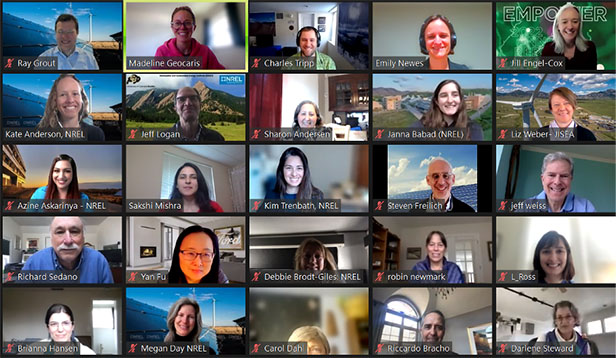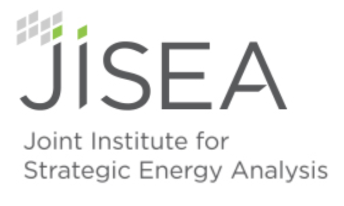2022 JISEA Annual Meeting Discusses Diverse Research, Announces New Director

May 3, 2022—The Joint Institute for Strategic Energy Analysis (JISEA) hosted its 2022 annual meeting as two virtual half-day sessions April 13–14. The meeting centered on the theme of "Empower," reflecting the institute's growing body of work to empower local energy transitions.
The meeting kicked off with Jill Engel-Cox, former JISEA director, and Juan Torres, associate laboratory director of Energy Systems Integration at the National Renewable Energy Laboratory (NREL). Torres announced the new JISEA director, Liz Doris.
Doris brings extensive expertise in policy and analysis to the JISEA director role. She has worked at NREL since 2005, most recently as the laboratory program manager for State, Local, and Tribal governments. She is currently serving as senior advisor on energy and environmental justice for the Department of Energy's Office of Energy Efficiency and Renewable Energy (EERE). Doris will start as JISEA director in October after completing her assignment with EERE.
"I know Dr. Doris will do an excellent job carrying on JISEA's mission," Torres said. "The institute's crosscutting expertise and forward-thinking approach are more important than ever, and I look forward to seeing how JISEA can continue to shape modern energy systems in 2022."
Day 1: Green Computing, Digital Transactions, Blockchain, and Crypto, Including Keynote Speaker Sakshi Mishra From Microsoft
Day 1 of the JISEA annual meeting focused on green computing—an emerging topic within the energy transition. As demand for high volumes of data processing, data analysis, and artificial intelligence (AI) grows, and computing systems permeate many aspects of modern society, computing has become a burgeoning consumer of energy and source of carbon emissions.
JISEA announced its new Green Computing Catalyzer that will advance green computing as a salient research domain at NREL and explore pathways to more energy-efficient computing.
The Green Computing Catalyzer joins two others in the JISEA Catalyzers initiative and will be led by Charles Tripp, machine learning and optimization researcher in NREL's Computational Science Center. "I'm honored to lead this opportunity with the Green Computing Catalyzer," Tripp said in a presentation during the annual meeting.
The day also included presentations by Cullen Bash, vice president of research and development at Hewlett Packard Enterprise, and Eric Masanet, chair of sustainability science for emerging technologies and head of the industrial sustainability analysis laboratory at University of California Santa Barbara.
Keynote speaker Sakshi Mishra, senior AI engineer at Microsoft and former NREL researcher, talked about the challenges and opportunities of integrating AI into physical energy systems. "It's not a question of whether to use AI at this point," Mishra said. "AI has proven its value. There will be challenges, but the payoff is well worth it."

Left to right: former JISEA Director Jill Engel-Cox, incoming JISEA Director Liz Doris, NREL Energy Systems Integration Director Juan Torres, and interim JISEA Director Emily Newes
Day 2: Net Zero/Net Negative World and the Future of Transportation
Day 2 of the JISEA annual meeting explored achieving net-zero emissions worldwide. The day started with Caroline Uriarte, NREL program manager of low-emission development strategies in developing countries and technical director of the Low Emission Development Strategies Global Partnership. Uriarte presented on the Net Zero World Initiative that is bringing together U.S. federal agencies and national laboratories, governments, and philanthropies around the world to accelerate global energy system decarbonization.
Michael Obersteiner, director of the Environmental Change Institute at Oxford University, presented on the net-negative carbon economy, and Rob Jackson, professor of earth system science at Stanford University, presented on the challenges to stabilizing global temperatures at 1.5° to 2°C—highlighting industries that will face more challenges to decarbonization.
Later, the meeting shifted to the future of sustainable transportation and welcomed Patrick Bean with Tesla, Lew Fulton with the University of California Davis, and Yan Fu with Ford. The group engaged in a dynamic conversation moderated by Chris Gearhart, director of NREL's Center for Integrated Mobility Sciences, about barriers and opportunities to reaching zero-carbon transportation by 2050.
"We've got to move fast," said Patrick Bean, global charging and energy policy lead at Tesla. "I don't think people appreciate how quickly this transition is happening. The demand is there. When people drive an electric car, it's a different experience and they realize, Wow, I can do this. But the supporting industries can't move as quickly, so how do we scale and speed the infrastructure?"
"We also need aggressive and well-designed policy that gives the public reassurance that this transition to electric transportation is going to happen," Lewis Fulton added. "It gives the customer confidence and shows industries the targets are serious and going to happen."
The day concluded with breakout discussions with energy experts at NREL and JISEA on topics including supply chains, sustainable and resilient communities, air pollution and climate, agricultural energy and efficiency, and clean energy for oil and gas.
Presentations
Green Computing Catalyzer Kickoff: Green AI Directions
Table Topic: Sustainable and Resilient Communities
Table Topic: Agricultural Energy and Efficiency
Table Topic: Clean Energy for Oil and Gas
Back to JISEA News >
